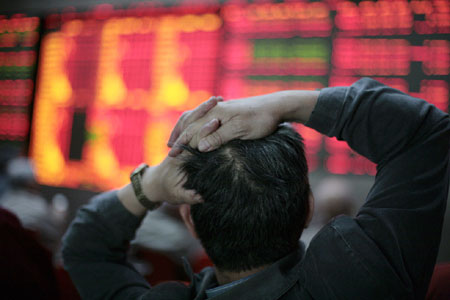Personal Finance
Hard choices for investors
By Li Xiang (China Daily)
Updated: 2010-05-17 09:35
 |
Large Medium Small |
|
 |
|
An investor looks at stock quotes at a securities trading firm in Shanghai. China stocks fell continuously last week, deepening the bear market's losses, on concern the government will increase borrowing costs to curb accelerating inflation and rising property prices, dampening consumer spending. [Kevin Lee / Bloomberg] |
BEIJING - The recent slump in Chinese equities has turned the stock market into an attractive investment option for investors. Pan Weiting says there is no better place to put her money than in stocks.
Pan shelved plans to buy an apartment after real estate prices jumped the most on record and the government banned loans for third homes to cool the economy. Interest on the 400,000 yuan she has in her bank account is being eaten away by rising inflation, and the country's regulations limit her investment choices to property or domestic equities.
"The stock market is the best choice at the moment," said Pan, a 27-year-old Shanghai accountant. "Even the bank staff advised me against depositing more money."
Government leaders sought to deflate a speculative bubble that London-based property broker Knight Frank LLP said sent property prices up 25 percent in the fourth quarter by curbing mortgage loans. It left people in the nation with the world's biggest savings with few places to put their money.
US investment bank JPMorgan Chase & Co expects China stocks to rally more than 40 percent in a year while Robeco Group, an asset management company in the Netherlands, forecast a second-half rebound.
"It becomes a question of who is the least ugly girl at the fair," said Victoria Mio, a Hong Kong-based senior fund manager at Robeco, whose firm oversees $194 billion worldwide. "There is some migration occurring and the shift will accelerate with a few months of negative interest rates."
As much as $59 billion, about a third of the housing transaction volumes in the 35 biggest cities in 2009, may be diverted from property to equities this year, according to Citic Securities, China's biggest listed brokerage.
China's $7.2 trillion of corporate and household savings is being eroded as inflation rises. The nation's inflation rate is forecast to climb 3.4 percent this year, according to the median estimate of 18 economists surveyed by Bloomberg on May 11.
The Shanghai Composite Index has declined 17 percent this year, the world's second-worst performer among the 93 gauges tracked by Bloomberg. It's happened on concern the government will keep tightening monetary policy to contain inflation and avert asset bubbles. "Chinese stocks would be their first choice for investment because they may remain cautious about the property market in the short term," said Shi Lei, a Beijing-based analyst at Bank of China Ltd, the biggest foreign currency trader. "The fixed deposit would be their last choice."
But Zhang Qi, an analyst at Haitong Securities, said the capital diverted from the property market was unlikely to alter the near-term weak momentum of the stock market. "We do expect a certain amount of capital to flow into the stock market but the impact is not going to be strong enough to change the current weak trend in the market," he said.
|
||||
Hu, 33, said he would not buy more property given the government's curbs. Instead, he plans to double his stock investments in the next six months to 3 million yuan.
"Property prices are probably going to take a breather with the current tightening," said Hu. "Currently stocks look the best bet."
For Pan Weiting, equities also trump home ownership for now. She doesn't plan to resume her search for an apartment in Shanghai's eastern Pudong district until prices decline by 20 percent.
"It's always good to own the roof over your head but you've got to be able to afford it. For now, it's out of my reach," she said.
Bloomberg News contributed to the article



